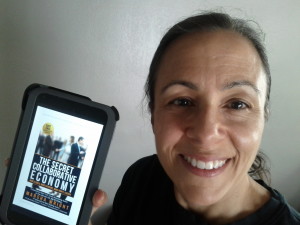 If you are drawn to a solopreneur business, you might be someone who likes to charge ahead alone. You like the idea of sinking or soaring all on your own merits. If it fits your personality, it’s one of the greatest benefits of having a one-person business. If you thrive by collaboration, you might need to look at another business model or tweak your solopreneur business so you have more collaboration.
If you are drawn to a solopreneur business, you might be someone who likes to charge ahead alone. You like the idea of sinking or soaring all on your own merits. If it fits your personality, it’s one of the greatest benefits of having a one-person business. If you thrive by collaboration, you might need to look at another business model or tweak your solopreneur business so you have more collaboration.
Autonomy is great if you like it (and I do!). I love the idea of getting to work on what I want, when I want and having it all ride on me. I love not having to “sell” my ideas to anyone before I do them. The lack of chain-of-command means I can think of something and get right to work on it.
However, there is a down side to autonomy even if you like it. With nobody to stop you, it’s really easy to wander off in a wrong direction. An idea can sound great when you think of it at 3:00 in the morning, and can feel great when you work on it at 6:00 in the morning, but without any approval process you can be working on things that aren’t destined to be profitable. It’s way to easy to spend time on a project that is fun but has no real income potential. When you work with others, you have a manager to report to, and projects are picked with the company-wide focus in mind. There is somebody monitoring whether or not a particular project is a good idea or not.
When you work alone you can work on anything you want, and that means you can work on things that are bad ideas. It’s a big trap for solopreneurs, but there are ways to avoid going too far off the right plan for you.
First, do your homework before taking on a new project. Do some market research – see what’s selling on your competitors’ websites and ask your potential clients what they want. Make sure you have at least some evidence that what you are creating will sell.
Second, seek the advice of a mentor. Even though I love and advocate the solopreneur business model, it’s important to have an objective person to give you opinions and advice. Often, an outsider will not have your emotional attachment to a project and so they can be more objective. I do offer this kind of help – if you want more information click here.
Do you enjoy your autonomy? How do you keep yourself on plan? Tell me about it in the comments.
(Autonomy is one of the advantages of a solopreneur business. There are many others, as well as some disadvantages. If you are thinking of a solopreneur business, grab my Kindle book “Is a Solopreneur Business Right for You?“)









